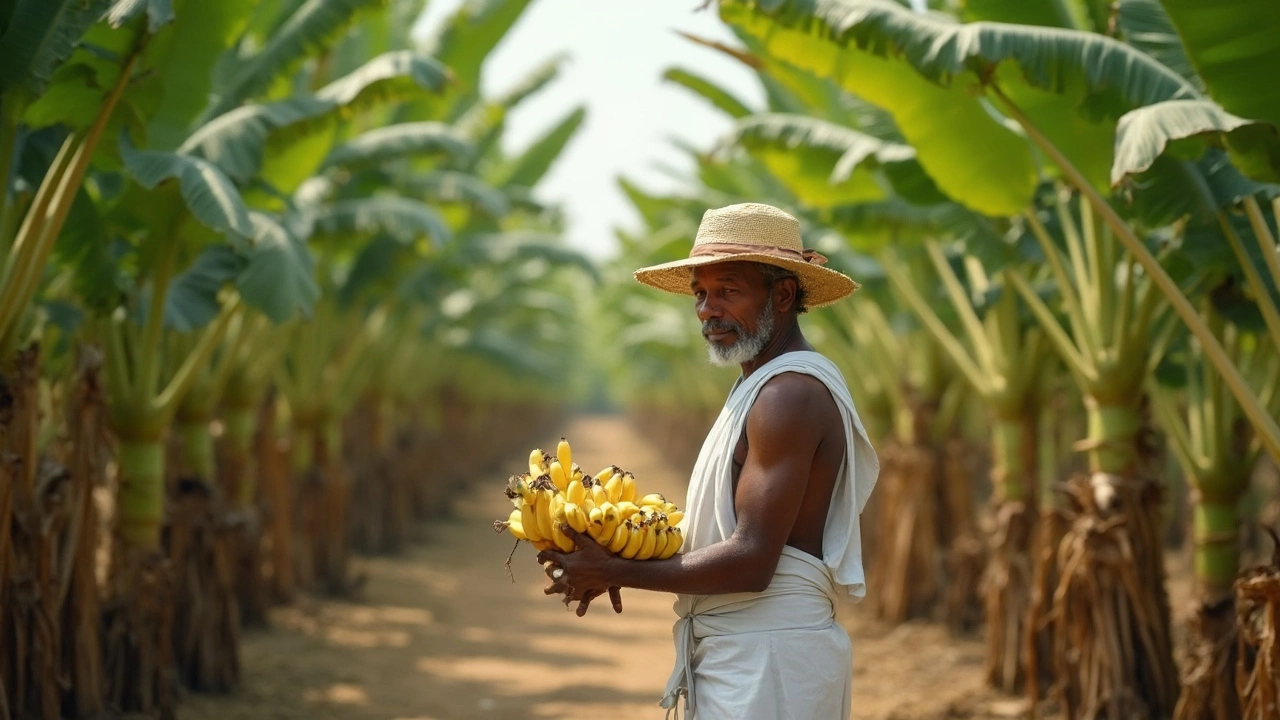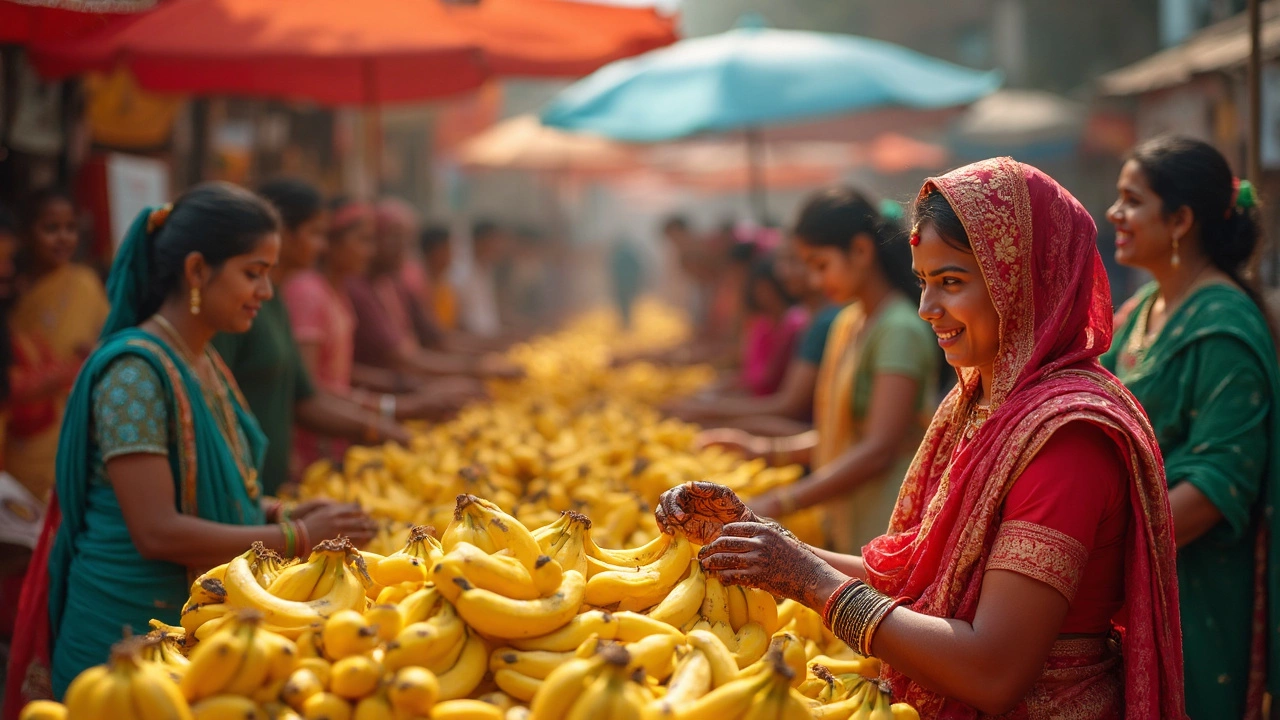Bananas are everywhere in India. You'll see them stacked high in fruit stalls and even offered up in roadside shrines—this fruit is a big deal. Still, if you're traveling here, you might wonder if it's safe to eat them. Let's break it down and make sure you enjoy this staple without any hiccups.
First off, understanding how bananas are farmed in India can give you a clue about their safety. Farmers use a variety of techniques, and while some are as modern as you'll find anywhere, others are more traditional. Either way, local farming generally respects the environment, which is a win for us and the planet.
- Understanding Banana Farming
- Hygiene and Safety Concerns
- Where to Buy
- Spotting Quality Bananas
- Health Benefits
Understanding Banana Farming
When you're wandering through an Indian market, practically tripping over the abundant stacks of bananas, you might wonder about the journey these fruits took to get there. India is one of the largest producers of bananas, and that shows in their presence throughout the country.
Traditional vs. Modern Farming
Indian farmers are resourceful, often blending local farming techniques with modern practices to maximize their yield. Traditional methods like organic farming are still widely used, especially in rural areas. These methods emphasize minimal chemical use, opting instead for natural pest control and organic fertilizers. It's like farm-to-table, but better because it's farm-to-street-market.
Modern Techniques
Don't think India is stuck in the past, though. In more developed areas, farmers use advanced systems like drip irrigation and tissue culture for improving banana quality and yield. These methods not only save water but also boost the resilience of the plants against diseases.
Farming Regions
Mostly, bananas are farmed in the southern states like Tamil Nadu, Andhra Pradesh, and Maharashtra. If you find yourself in these regions, you'll likely be tasting bananas that are super fresh and possibly direct from the nearby farms. The tropical climate in these areas is just perfect for growing this fruit.
Seasonality and Types
If you think a banana is just a banana, think again. Different varieties pop up throughout the year as different regions produce different types. The most common types you'll find are the Cavendish, the small yet mighty robusta, and the unique Nendran banana that's used for chips.
| Region | Main Variety |
|---|---|
| Tamil Nadu | Cavendish |
| Maharashtra | Robusta |
| Kerala | Nendran |
So whether you're picking bananas to snack on or to accompany your spicy rice dish, understanding where and how they are grown can definitely add to the flavor. The way bananas are cultivated in India means you're often getting something fresh, local, and responsibly farmed. Doesn't that make it taste a little sweeter?
Hygiene and Safety Concerns
When it comes to eating bananas in India, feeling good about hygiene and safety is key. The truth is, bananas generally come with a natural protective layer—their peel—which helps keep them safer than many other fruits you can buy.
That said, markets in India can vary widely in their cleanliness. If you're shopping for bananas from a street vendor, take a moment to assess the surroundings. Is the stall reasonably clean? Is fruit displayed on a clean surface?
Washing and Peeling
Always wash your bananas, even if you’re only eating the inside. Why? Because whatever's on that peel can transfer to your hands, and then to the delicious fruit inside. A quick wash with clean water at your hotel or guesthouse can go a long way.
Safe Purchasing Tips
- Buy from vendors that are busy—the assumption here is that a lot of buyers mean good fruit.
- Choose stalls under shade since direct sunlight can spoil fruit faster.
Once you've got your bananas, keep them away from sunlight and any spot with too much heat. A cool, dry place is where they want to be.
By focusing on where you buy and how you handle your bananas, you can enjoy them without a hitch. They're not just safe but also a truly wonderful part of the Indian experience.

Where to Buy
When you're in India, knowing where to pick up safe and tasty bananas can make your trip smoother. Not all places are created equal, so here's the scoop.
Local Markets
Hitting up local markets can be an adventure in itself. These spots often have super fresh bananas, and they're affordable too. Look for vendors with a clean setup, and don’t be shy to ask locals for recommendations. Visiting markets in the morning usually guarantees the freshest picks.
Supermarkets
If you're looking for a more familiar shopping experience, supermarkets like Big Bazaar, Reliance Fresh, or Spar are reliable options. They stock safe and high-quality bananas, thanks to their strict supply chains and refrigeration. You might pay a little more, but the convenience and standardization add peace of mind.
Street Vendors
Street vendors are everywhere, and while they're convenient, make sure to observe cleanliness. Look for vendors with plenty of foot traffic; that's usually a good sign. Buying bananas from vendors near tourist hotspots or temples often comes with a little markup, so it's something to consider.
Specialty Stores
In urban centers, you might stumble upon stores specializing in organic produce. These places can offer high-quality bananas, often sourced from small farms that prioritize organic methods. Prices might be a bit steeper, but the quality can be worth it, especially if you’re health-conscious.
Knowing where to buy is half the battle. Whether you go for the bustling market scene or the orderly aisles of a supermarket, understanding your options can help ensure that your bananas are safe and your travels are worry-free.
Spotting Quality Bananas
Picking the right banana might seem easy, but when you're standing in a bustling Indian market, it can feel overwhelming. Knowing how to spot a good one can make or break your banana-eating experience.
Look at the Color
First thing's first, check out the color. In India, bananas come in various types with different shades of green and yellow. A good rule of thumb? A little bit of green is okay, especially if you plan to eat them in the next couple of days. But be cautious with too much green, as they may not be ripe enough yet.
Feel the Texture
Give the banana a gentle squeeze. It should be firm but not too hard. If it feels too soft or has any mushy spots, it might be overripe. Firm bananas are great as they last longer and give you more time to enjoy them.
Check for Spots
A few brown spots are fine; they signal sweetness and good ripeness. But keep an eye out for large dark patches, which could mean the banana is past its prime.
Don't Forget the Smell
A fresh banana has a pleasant, mild aroma. If you notice a strong or odd smell, it's a good idea to pass on that bunch.
| Color | Texture | Spots | Smell |
|---|---|---|---|
| Yellow with a bit of green | Firm, not hard | A few brown spots | Pleasant, mild aroma |
By applying these simple checks, you can ensure you're choosing bananas that are both safe and delicious. Enjoy the variety that India has to offer and savor this staple without any worries!

Health Benefits of Bananas
Bananas are more than just a tasty fruit; they're a nutritional powerhouse that adds a lot of value to your diet, especially while traveling in India. Packed with essential nutrients, they’re a quick energy booster that can keep you going during your adventures.
Rich in Nutrients
Bananas are rich in vitamins and minerals. They’re a great source of Vitamin C, Vitamin B6, and potassium. Potassium is crucial for heart health and maintaining healthy blood pressure levels. When you're on the move, these nutrients can be a lifesaver against fatigue.
Good for Digestion
Loaded with dietary fiber, bananas help keep your digestive system in check. Traveling can sometimes throw your body off balance, and a daily banana can help regulate your digestive tract. They're easily digestible, reducing the risk of stomach aches after those spicy Indian meals.
Energy Booster
For anyone backpacking or touring extensively, bananas work like a charm as an energy snack. They provide quick-release energy to tackle those long walks under the sun or exploring bustling markets.
Improving Mood
Bananas contain tryptophan, which your body converts into serotonin, the mood-lifting hormone. So, enjoying a banana in the morning might just make your day a bit brighter, whether you're dealing with train delays or simply feeling a bit homesick.
Nutrition Data
| Nutrient | Per 100g |
|---|---|
| Calories | 89 |
| Carbohydrates | 22.84g |
| Dietary Fiber | 2.6g |
| Potassium | 358mg |
So there you have it—bananas are not only safe but incredibly beneficial for maintaining your energy and health while immersing yourself in the vibrant culture of India. Next time you see a vendor with a cart full of this yellow delight, don't hesitate to grab one!
